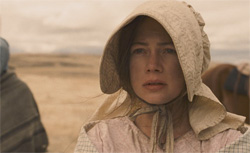Meek's Cutoff
A stripped-down feminist Western from director Kelly Reichardt.
After you've seen Meek's Cutoff, check out our Spoiler Special discussion:
You can also download the program here, or you can subscribe to the Spoiler Special podcast feed via iTunes or directly with our RSS feed.
Meek's Cutoff (Oscilloscope Features) is Kelly Reichardt's fifth feature film, and the third to receive any significant theatrical release. It's this austere filmmaker's first period piece and her boldest and most ambitious project to date. (Her last two, Old Joy and Wendy and Lucy, were contemporary road movies of a sort, miniature in scale but elegant in execution.) Meek's Cutoff is also the least successful of the Reichardt films I've seen, but even with its flaws, this stripped-down feminist Western feels like necessary viewing and a harbinger of potentially great things to come.
Based loosely on a true story (and scripted by Reichardt's longtime collaborator Jon Raymond, who also co-wrote Todd Haynes' adaptation of Mildred Pierce), Meek's Cutoff follows a group of pioneers—three couples, one with a young child and expecting another—who make their way through uncharted territory en route to Oregon's Willamette Valley in 1845. The group has contracted a guide, Stephen Meek (Bruce Greenwood, unrecognizable behind a thicket of beard) to lead it through this dangerous and largely waterless terrain toward civilization. But "civilization" becomes an increasingly abstract concept as this movie proceeds. Before a line of dialogue has been spoken—great chunks of the film pass in near-complete silence—one of the pilgrims (Paul Dano) carves a word into the trunk of a fallen tree: "Lost." Meek, it appears, isn't sure where they're going, though his cowboy bluster prevents him from admitting to any doubt. At every crossroads—not that there are any real "roads" in this wide-open wasteland—the men stop and confer about what route to take, just out of the women's earshot. (The sound design in these early scenes is brilliant, with the audience sharing the wives' frustration at those maddeningly inaudible male voices.)
Eventually the party, anxious about its diminishing water supply, crosses paths with a lone, possibly hostile Native American, of tribe unknown (Rod Rondeaux). After some debate about whether to shoot him on the spot, they agree to keep him captive in the hope that he'll lead them to the nearest water source. One of the wives, Emily Tetherow (Michelle Williams), takes tentative pity on the prisoner, offering him food and water and darning his worn-out moccasin—in part, as she points out to her frightened fellow settler Millie (Zoe Kazan), because she wants him to owe her something. But we're never sure, any more than the pioneers are, whether "the Indian" is plotting to kill them by deliberately leading them into an ambush or merely cooperating until he can make his escape. Unlike many films about the clash of white settlers and Native tribes, Meek's Cutoff holds out little hope for redemption or rapprochement, either at the personal or political level. Reichardt presents the violence of Manifest Destiny (personified in the character of Meek, a gonzo proponent of brute force) as a bleakly inevitable fate.
To the extent that this film—which is more focused on landscape and situation than on character—has a heroine, Williams' Emily is it. Her marriage to Solomon Tetherow (a wonderfully circumspect Will Patton) resembles a modern companionate partnership, with the husband turning to his wife for advice in their tent at night. Alone among the settlers, she dares to challenge Meek's claims that they're on track to their destination. Emily is also troubled by her own growing moral intuition that the "savage" they tie up to a stake at night is a human being worthy of respect.
Though Williams' face is a slow-burning marvel—her quiet ferocity makes her a natural muse for Reichardt—there's something about this character that doesn't sit quite right. Emily is too good and brave and clear-thinking, her embodiment of well-meaning liberal humanism too complete; rather than a character, she feels like an allegorical figure of justice, a comforting proxy for the audience. Reichardt mercifully steers clear of making the unnamed Indian into a symbol for noble savagery or a simple victim—rather, he's a frightened but canny man calculating his chances for survival. But the Emily/Meek power axis on which the plot turns seemed to me too starkly divided between colonialist cruelty and an ahistorical citizen-of-the-world compassion. And without giving away the enigmatic ending, I can say that the film's final moments—especially the last two lines of dialogue—strain for a mythopoetic grandeur that feels out of step with the modesty of what's come before.
It's because I'm such a fan of Reichardt's work that I hold Meek's Cutoff to a higher standard than I otherwise might. This is a grippingly original work, with gorgeous cinematography by Christopher Blauvelt, and the first hour or more achieves something like greatness. It's also a movie about getting lost, about encountering the terror and vastness of the unknown. Even if the film loses its own way a bit in the last half hour, it's hard to blame Kelly Reichardt for striking out for new territory.
For more on director Kelly Reichardt's movies, read Elbert Ventura's "The Wanderer" in Slate.

